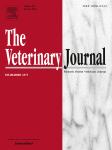Ver ítem
- xmlui.general.dspace_homeCentros e Institutos de InvestigaciónCICVyA. Centro de Investigación en Ciencias Veterinarias y AgronómicasInstituto de VirologíaArtículos científicosxmlui.ArtifactBrowser.ItemViewer.trail
- Inicio
- Centros e Institutos de Investigación
- CICVyA. Centro de Investigación en Ciencias Veterinarias y Agronómicas
- Instituto de Virología
- Artículos científicos
- Ver ítem
Antiviral agents against equid alphaherpesviruses : current status and perspectives
Resumen
Equid herpesvirus infections cause respiratory, neurological and reproductive syndromes. Despite preventive and control measures and the availability of vaccines and immunostimulants, herpesvirus infections still constitute a major threat to equine health and for the equine industry worldwide. Antiviral drugs,
particularly nucleoside analogues and foscarnet, are successfully used for the treatment of human alphaherpesvirus infections. In equine medicine,
[ver mas...]
Equid herpesvirus infections cause respiratory, neurological and reproductive syndromes. Despite preventive and control measures and the availability of vaccines and immunostimulants, herpesvirus infections still constitute a major threat to equine health and for the equine industry worldwide. Antiviral drugs,
particularly nucleoside analogues and foscarnet, are successfully used for the treatment of human alphaherpesvirus infections. In equine medicine, the use of antiviral medications in alphaherpesvirus infections would decrease the excretion of virus and diminish the risk of contagion and the convalescent
time in affected horses, and would also improve the clinical outcome of equine herpesvirus myeloencephalopathy. The combined use of antiviral compounds, along with vaccines, immune modulators, and effective preventive and control measures, might be beneficial in diminishing the negative impact of alphaherpesvirus infections in horses. The purpose of this review is to analyse the available information regarding the use of antiviral agents against alphaherpesviruses, with particular emphasis on equine alphaherpesvirus infections.
[Cerrar]

Autor
Fuente
Veterinary journal 207 : 38-44. (January 2016)
Fecha
2016
ISSN
1090-0233
Formato
pdf
Tipo de documento
artículo
Palabras Claves
Derechos de acceso
Restringido
 Excepto donde se diga explicitamente, este item se publica bajo la siguiente descripción: Creative Commons Attribution-NonCommercial-ShareAlike 2.5 Unported (CC BY-NC-SA 2.5)
Excepto donde se diga explicitamente, este item se publica bajo la siguiente descripción: Creative Commons Attribution-NonCommercial-ShareAlike 2.5 Unported (CC BY-NC-SA 2.5)

